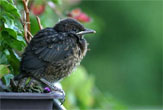City Birds Cope with Stress Better

Blackbirds born in urban environments have developed ways to keep their stress levels down compared to their forest-dwelling counterparts, a new study suggests.
The research shows for the first time that city life impacts how wild animals respond to stressors. For instance, whereas creating a nest on the side of an apartment building may not rouse a second-generation city blackbird, the same scenario could skyrocket anxiety chemicals in rural birds.
The study, performed by researchers at the Max Planck Institute for Ornithology in Germany, is detailed in the August issue of the journal Ecology.
Stressed out
The researchers captured week-old blackbird nestlings from a forest habitat and from the center of Munich and hand-raised them in controlled laboratory conditions for one year.
The researchers measured levels of glucocorticoids, stress hormones that help the birds survive under difficult environmental conditions.
Compared with the forest-born nestlings, the urban birds showed reduced levels of stress hormones after the researchers had stressed the birds by capturing them in cotton bags and handling them.
Sign up for the Live Science daily newsletter now
Get the world’s most fascinating discoveries delivered straight to your inbox.
"The main thing is catching the birds and handling them. That's a relatively rough stressor," study team member Jesko Partecke told LiveScience.
The researchers suggest that the reduced stress response in urban birds has a genetic basis and that it developed as a way to cope with anxieties unique to city life, including light pollution, noise, and close proximity of humans.
"They have to cope with completely different environmental conditions compared with forest birds," Partecke said.
In birds and other vertebrates, including humans, prolonged elevation of glucocortoids can impair reproductive, immune and brain functions. To survive amidst humans, the blackbirds have decreased the release of stress hormones that are only beneficial on a short-term basis.
Other urban animals
Whereas previous studies have reported behavioral differences between birds born in concrete settings and those in natural habitats, changes in physiological stress responses have not been documented. For instance, scientists have found that city blackbirds are often tamer than their forest-living relatives.
The new study results could explain the impacts of city stresses for more than just the European blackbird.
"Urbanization is not only happening in European blackbirds, but all over the world a lot of animals are colonizing these urban areas," Partecke said.
After the one-year study, Partecke and his colleagues released the birds into the wild. They hope to receive grant money to pursue lingering questions. "We don't know anything about the consequences of reduced stress levels," Partecke said.
Jeanna Bryner is managing editor of Scientific American. Previously she was editor in chief of Live Science and, prior to that, an editor at Scholastic's Science World magazine. Bryner has an English degree from Salisbury University, a master's degree in biogeochemistry and environmental sciences from the University of Maryland and a graduate science journalism degree from New York University. She has worked as a biologist in Florida, where she monitored wetlands and did field surveys for endangered species, including the gorgeous Florida Scrub Jay. She also received an ocean sciences journalism fellowship from the Woods Hole Oceanographic Institution. She is a firm believer that science is for everyone and that just about everything can be viewed through the lens of science.









